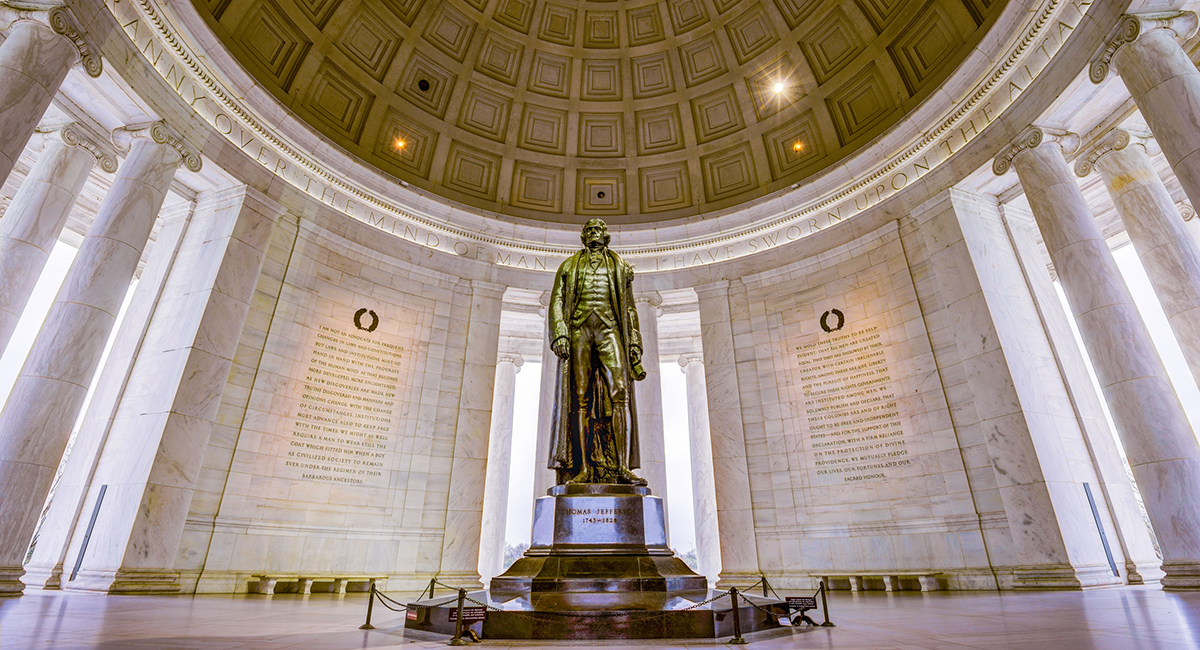Did America’s Founding Fathers really embrace a nationalist economic program of tariffs and industrial subsidies? According to the “National Conservative” movement, such Founding Era luminaries as Thomas Jefferson and James Madison eventually abandoned their free-trade instincts and embraced a program of economic policies not unlike the NatCon agenda today. The American Compass website celebrates “Thomas Jefferson’s conversion to Hamiltonian supporter of domestic industry,” echoing Patrick Buchanan’s 2018 claim that “Tariffs Made America Great.” Most arguments in this genre point to Jefferson’s qualified commentaries on the Tariff of 1816 as evidence of this claim, while also noting the law was signed by James Madison, his distinguished successor as president. These actions, the NatCons insist, demonstrate that the Founding generation converted to the interventionist economic program of the American System, first outlined by Sen. Henry Clay in a famous speech in 1824.
The NatCon’s historical narrative seeks to wrap their own present-day, pro-tariff arguments in the imprimatur of the American Founding. If protectionism worked for Hamilton, Jefferson, and Madison, then it will also work for us today, they claim. While Hamilton, who died in a duel in 1804, did indulge protectionist arguments during his stint as Secretary of the Treasury, the rebranding of Jefferson and Madison as American System enthusiasts runs directly contrary to historical evidence.
Madison and Jefferson were both still alive when Henry Clay outlined his American System platform in 1824. Contrary to the NatCon claims, neither founding father approved of Clay’s proposals. In fact, both condemned it as a constitutional overreach by the federal government.
James Madison reviewed a transcript of Clay’s speech a few weeks after its delivery in the Senate chamber. On April 24, 1824 the primary architect of the Constitution wrote the Kentucky Senator a lengthy letter. After crediting Clay for his eloquence, the former president proceeded to lodge his concerns: “candor obliges me to add that I can not concur in the extent to which the pending Bill carries the tariff, nor in some of the reasoning by which it is advocated.” Madison then presented Clay with a lesson in basic free-market economics:
The Bill, I think, loses sight too much of the general principle which leaves to the judgment of individuals the choice of profitable employments for their labor and capital: And the arguments in favor of it drawn from the aptitudes of our situation for manufacturing Establishments, tend to show that these would take place without a Legislative interference. The law would not say to the Cotton planter, you overstock the market, and ought to plant Tobacco: nor to the planter of Tobo, you would do better by substituting Wheat. It presumes that profit, being the object of each, as the profit of each is the wealth of the whole, each will make whatever change the state of markets and prices may require. We see, in fact, changes of this sort frequently produced in agricultural pursuits by individual sagacity watching over individual interest. And why not trust to the same guidance in favor of manufacturing industry, whenever it promises more profit than any of the Agricultural Branches; or more than mercantile pursuits from which we see capital readily transferred to manufacturing Establishments likely to yield a greater income.
Madison did hedge his commitment to a modest degree, deviating from a pure laissez-faire stance on economic matters. He declared himself “a friend to the general principle of ‘free industry’ as the basis of a sound System of political Economy,” but recognized certain “particular reasons for exceptions to the General Rule, not derogating from its generality.” He was therefore willing to entertain a “a moderate tariff that would at once answer the purpose of revenue, and foster domestic manufactures,” perhaps not unlike the bill he approved during his own presidency.
Historical context is important in interpreting this passage though, as it is not an endorsement of the full-fledged protectionist program sought by Clay. In the early 19thcentury, tariffs provided the single largest source of revenue for the federal government. This circumstance gave rise to the doctrine of the Revenue Tariff with “incidental protection” insofar as the tax measure could be designed to offer moderate encouragement to domestic industries as a secondary effect of filling the treasury. This was not Clay’s objective though; the Kentuckian sought significantly higher tariff rates to provide explicit protection to industry, even at the price of losing tax revenue.
Madison clearly understood as much, warning Clay that his proposed “increase of duty on articles which will be but partially manufactured at home, with the annual increment of consumers, will balance at least the loss to the Treasury from the diminution of the tariffed imports.” At the same time, the claimed benefits to protected industries would be “frustrated by the increase of smuggling” and other forms of tax evasion. In the end, he predicted that Clay’s measure would fail in its objective of fostering an industrial base in the young nation. The “Tariff, I apprehend will disappoint also those who expect it to put an end to unfavorable balances of trade,” he continued, as Americans were “accustomed to buy not only as much as we can pay for but as much more as can be obtained on credit.” Although Madison did not fully grasp the fallacious economic reasoning behind the drive to obtain a positive balance of trade, he did not fret at the United States’ failure to do so. “As long as our exports consist chiefly of food and raw materials, we shall have the advantage, in a contest of privations, over a nation supplying us with superfluities.”
Whereas Madison framed his opposition to the American System as constructive criticism to Clay, Thomas Jefferson responded by directly mobilizing his political contacts to defeat the tariff and subsidies program. Clay’s package contained a large “internal improvements” scheme, designed to assist politically connected industries with infrastructure spending and similar federal handouts. These measures illustrated the worst aspects of pork-barrel politicking, which is precisely why they were able to attract special interest support in Congress.
By late 1825, Jefferson considered the situation desperate. In a letter to Madison, he denounced Clay’s American system in no uncertain terms. Not only did the “internal improvements” scheme reach beyond the enumerated powers of the federal government, it imperiled the entire constitutional order of the United States.
To this end, Jefferson personally drafted a “Declaration and Protest of the Commonwealth of Virginia” to denounce Clay’s scheme as a direct violation of the United States Constitution. The document directly hearkened back to a strategy Jefferson and Madison pursued in 1798 with the Virginia and Kentucky Resolutions, a pair of measures adopted at the state level to oppose the Alien and Sedition Acts as unconstitutional violations of the First Amendment.
In his new document, the author of the Declaration of Independence set his sights directly on the federal government’s recent expansions into areas of economic policy that were not granted by the US Constitution. As the resolution opens, “the federal branch has, assumed in some cases and claimed in others, a right of enlarging it’s (sic) own powers by constructions, inferences, and indefinite deductions, from those directly given, which this assembly does declare to be usurpations of the powers retained to the independent (sic) branches, mere interpolations into the compact, and direct infractions of it.”
As examples, Jefferson targeted Clay’s program for asserting a federal “right to construct roads, open canals, and effect other internal improvements.” He turned his fiery pen to tariffs next, lambasting Congress for interpreting the Constitution’s taxation clause as “a power to do whatever they may think, or pretend, would promote the general welfare” of the United States. Such an interpretation, Jefferson warned, would turn the federal government into “a complete government, without limitation of powers.” Such measures, he concluded, undermined the spirit and letter of the Constitution itself.
Jefferson’s protest was not a nullifier’s document in any sense. Indeed, it affirmed Virginia’s commitment to “the blessings of their union” with the other states and warned that a “rupture” of the federal bond would constitute “among the greatest calamities which could befall them.” It adopted a pragmatic stance of abiding by this objectionable legislation, should it pass or grow in fervor, “to preserve the peace” of the country, while simultaneously denouncing it as unconstitutional in the strongest terms.
At the same time, Jefferson alerted his allies in the Virginia General Assembly to prepare to make a stance against the American System measures. In a January 1826 letter to assembly member William Gordon, Jefferson warned in the strongest possible terms against the course Clay and his followers had charted for the country:
“It is but too evident that the branches of our foreign department of gov[ern]m[en]t, Ex[ecuti]ve, judiciary and legislative are in combination to usurp the powers of the domestic branch also, reserved to the states and to consolidate themselves into a single gov[ern]m[en]t without limit[atio]n of powers. I will not trouble you with details of the instances which are thread bare and unheeded. The only question is what is to be done? Shall we give up the ship? No, by heavens! While a hand remains able to keep the deck.”
Jefferson noted the peril of the American System came from its propensity to attract votes through political payoffs and handouts. “The Western states have especially been bribed by local consid[eratio]ns to abandon their ancient brethren and enlist under banners alien to them in principles and interest,” illustrating why it was difficult to defeat such measures through legislation. For the moment, he knew that his allies lacked the votes to stop the tariff and internal improvement measures.
At best, Jefferson hoped that they could delay them through compromise measures that weakened the bills and slowed the federal government’s encroachment. As he closed his letter “I pray that what I have now hazarded to you as a friend may be sacredly locked up in your own breast.” At 83 years, 61 of them in public life, his energies were exhausted. It was time for the new generation to stand against the growth of government power, and the aged Virginia statesman could only hope that others would reinvigorate constitutional constraints against this latest turn of events. In this word of counsel, Jefferson made his last major foray into governance, dying on July 4th of the same year. It should be remembered that his final political actions stood firmly against Henry Clay’s program of economic interventions.
Today’s NatCons would do well to heed his counsel before repeating the same mistakes that broke the Constitution’s original constraints on federal power, and opened the door to almost two centuries of legislative, executive, and regulatory intrusions into every aspect of American economic life.









